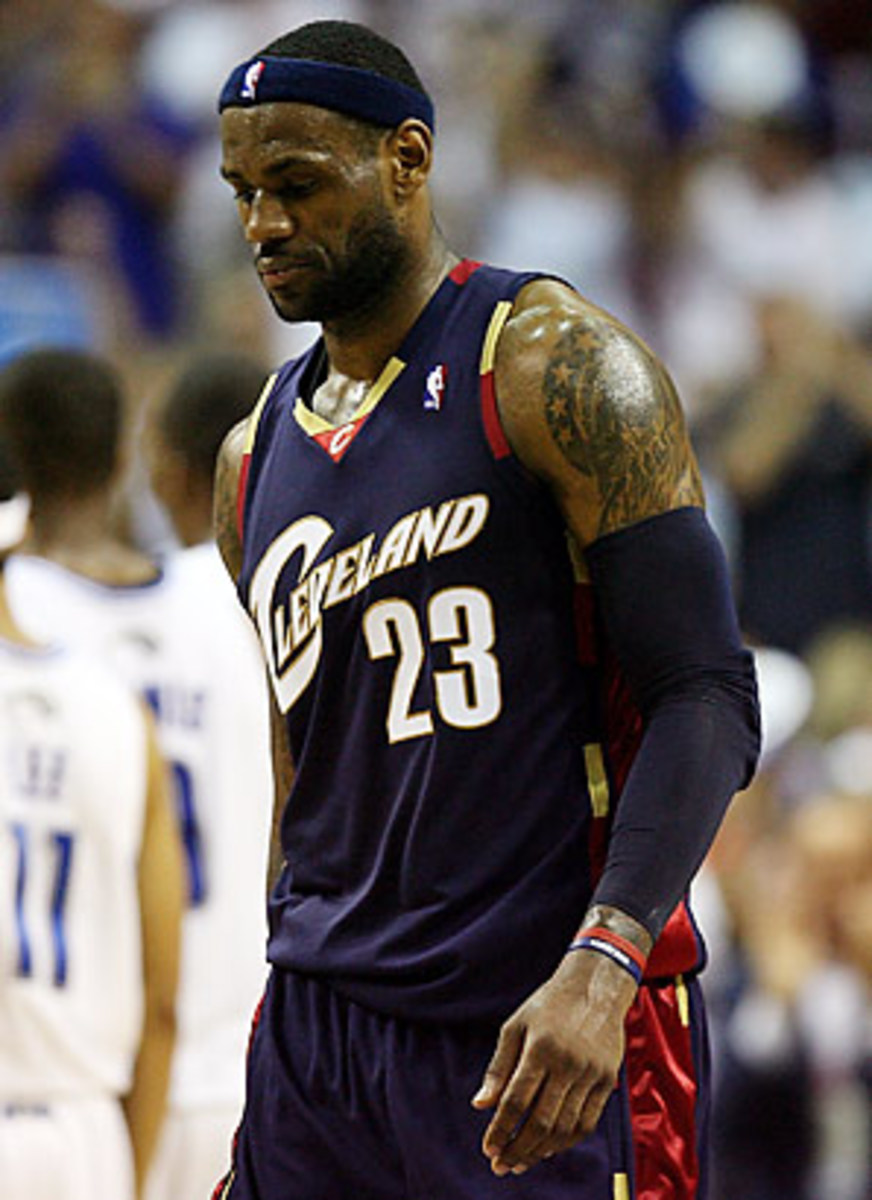LeBron sent a clear message by not shaking hands with Magic
LeBron James should have shaken hands and congratulated the Orlando Magic the other night. We're all in agreement on that, are we not? He didn't have to be particularly warm, he didn't even have to be sincere. He just needed to bump a couple of fists, or maybe give out a quick man hug or two, before he headed off to the locker room after the Magic eliminated his Cavs from the playoffs on Saturday. Not only would it have saved him the smattering of grief he's been getting from the media and fans the last few days, it just would have also been the right thing to do.
There's not much debate to be had there. You're not likely to find anyone who would seriously argue that snubbing the Magic was a classy move on King James' part. The more interesting question is, Why did LeBron do it? How could a player who has really never been guilty of even the slightest public misstep in his behavior make such an obvious blunder? Or was it a blunder at all?
The simple answer would be that his sportsmanship circuitry just shorted out momentarily. This, after all, was the first time that James had lost a playoff series that his team was widely expected to win. He had never suffered an upset before and he was, well, upset. His explanation the next day hinted that he skipped out -- he didn't talk to reporters after the game, either -- because losing was just too much to bear. "I'm a competitor," he said. "That's what I do. It doesn't make sense to me to go over and shake somebody's hand."
That's almost believable, because James has grown up in an era in which the definition of a great competitor has been badly skewed. We heap so much praise on an athlete who "hates to lose" that some players don't even recognize when that hatred goes too far. It's been said that Michael Jordan would have cheated his own grandmother to win at cards. That's not passion. That's unhealthy.
But so many athletes are now cut from that cloth. They think the inability to deal with defeat gracefully is a sign of competitive fire, when it's often a sign of immaturity. A real competitor gives every ounce of effort to win, but is enough of a man to give respect to an opponent who does the same and prevails.
But the thing is, James has always seemed to get that. He's intelligent and remarkably mature, and beyond that, he's also extremely savvy about building and maintaining his own image. It's hard to believe he was just so overcome by disappointment that he forgot his manners. The guess here is that James knew exactly what he was doing when he turned his back on the Magic, and it had nothing to do with Orlando. By not uttering a word, he was speaking volumes to Cavs management.
It's not hard to connect the dots. James wasn't so devastated by the loss -- it had been clear at least since Game 4 that the Cavs were going to be hard-pressed to win the series, so he had time to get used to the idea -- he was sick of six games of having to do nearly everything himself to keep Cleveland from getting run off the floor. James was more angry than he was disappointed, and given his ability to become a free agent at the end of the year, that anger should have been quite frightening to GM Danny Ferry and the rest of the Cleveland front office. James was putting Ferry on notice that he has no intention of trying to drag this group to a championship again. More help had better be on the way next year, King James seemed to be saying, or tell the Knicks to start getting my uniform ready.
Now, James isn't ready to say all that publicly yet. That's where the public relations savvy comes in. He has another year in Cleveland, at least, and he doesn't want to spend it being portrayed as the demanding superstar threatening the franchise, with his eye on greener pastures. That's more of a Kobe way to play it. No, by drawing attention to his displeasure by abruptly walking off, James was telling the Cavs that if he has to walk away like this at the end of next season, he just might keep walking all the way to New York.
Ferry does have some salary flexibility to play with, so the possibility of tweaking the Cavs roster is there. But James also has some decisions of his own to make, beginning with coach Mike Brown. (And if you think Brown's future will be decided by anyone but LeBron, you're kidding yourself.) Despite his Coach of the Year award, Brown didn't exactly dazzle anyone with his work in the playoffs. Having an assistant draw up plays in the huddle while he tried to look busy, for instance, was a bad, bad look.
But Brown and James have a close relationship, and James will have to decide whether he thinks Brown is the coach who can lead the Cavs to a championship. You get the feeling that it will take a title next season for LeBron to stay in Cleveland, and if that's the case, James might decide that he needs a more experienced, proven coach to make that run.
It all adds up to a fascinating off-season for LeBron and the Cavs, one that began with that game-ending, message-sending walk off the court last Saturday night. It might have seemed like James had finally made a little mistake, but don't be fooled. He knew exactly where he was going.






